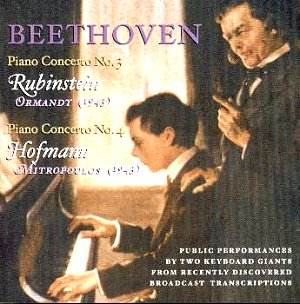These two live performances were captured for
posterity two months apart in New York. They document a pianist
coming to the end of a glorious career – and in somewhat intermittently
inglorious decline – and another pianist who, though already fifty-seven,
had another thirty years or so of concert giving and recording
ahead of him. Hofmann, whose 1924 Brunswicks are one of the wonders
of the pianistic world, was a famously controversial Beethovenian.
The live 1941 broadcast of the Fourth Concerto with the Philharmonic-Symphony
conducted by John Barbirolli has done the rounds before and is
generally admired. This slightly later broadcast with Mitropoulos
both reinforces and clarifies features of his concerto performances
and does so to considerable, albeit mixed, advantage.
As ever with Hofmann the ear is confronted with
some modulatory bars before the initial piano entry in the Concerto
in G. This was a habit of certain Golden Age pianists but I must
admit I didn’t realise the practice extended to launching thus
one of the greatest works in the repertoire. He is nevertheless
in fine technical form – and one should absorb the hyper-explosive
bass accents he unleashes from time to time in the opening movement
as examples of incinerating, echt Romanticism at its most brazen.
There are highly personalised moments of left-right hand balance
and some Hofmannesque voicings that will catch the unwary off
guard. He plays the Reinecke cadenza. Mitropoulos follows with
incisive commitment; nothing neurotic intrudes. As for the slow
movement, well it’s of considerable interest. Not only does Hofmann
not play synchronous chords – left hand before right was the expected
practice of many pianists of his generation – but he also actually
rolls his chords in the solo piano’s second statement. There’s
touching up and there’s touching up and even for me – one who
basks in the glories of individualised and personalised musical
performance – this smacks of prettifying. His whole ethos here
is in fact very cool, despite this, or because of it. Indistinct
voicings make themselves apparent in the last movement – the melody
line is not always audible – and as he leaps into the cadenza
with a cavalier drive his leonine drama-laced peroration is just
too exaggerated and pleased with itself for genuine musical sympathy.
Highly interesting to hear one of the giants of course but too
idiosyncratic for a general recommendation.
After which Rubinstein comes as a much more central
interpretation - though one not without its own points of interest.
I felt that the first movement of the Concerto in C minor (Music
& Arts have it as the Concerto in C) was rather bedevilled
by Rubinstein’s occasionally self-conscious phrasing. As a result
it lacks a certain amount of inner tension though of itself it’s
quite quick –his rubati are good and his accelerandi somewhat
combustible. I liked the Busoni modified Beethoven cadenza which
Rubinstein despatches with aplomb. It’s doubtless not Ormandy’s
fault that sometimes the bass line sounds muddy and indistinct
– and equally that Rubinstein does sound a little withdrawn in
the Largo. By the fugato episode in the finale the playing is
dashing and there is some finely etched orchestral playing and
if the performance as a whole is rather inconsistent it is at
least consistently inconsistent. Rubinstein recorded the Concerto
five times in all – Toscanini in 1944, Krips in 1956, Leinsdorf
in 1965, Dorati in 1967 and Barenboim in 1975 - though doubtless
other live traversals will turn up.
This has been a most rewarding if occasionally
infuriating listen. The presentation is first class and Gary Lemco’s
notes full of curiosity and interest. If I am less impressed by
the performances than he is then at least he makes his case with
care and judgement.
Jonathan Woolf
